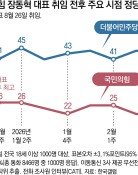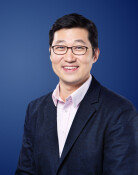A society full of Jamies allows for no genius moments
A society full of Jamies allows for no genius moments
Posted March. 07, 2025 07:39,
Updated March. 07, 2025 07:39
The four-year-old Jamie’s mom, Lee So-dam, is deeply impressed by her kid counting pieces of snack, which she describes as a “genius moment.” Jamie’s native English teacher calls to say that Jamie has successfully been potty-trained, so Dam happily cancels the tutoring program for toilet training. With one time slot reserved for another lesson on Jamie’s timetable, the mom goes off to interview a tutor for Jegichagi because she wants Jamie to get ready to play Jegi, which is depicted in “Squid Game Season 2,” as part of a school performance assessment just in case.
Comedian Lee Soo-ji’s parody video depicting a “doting mom” has hit seven million views since it was released online last month. The video clip satirizes the intense early learning methods associated with Gangnam-style parenting and has stirred up a debate for the past weeks.
Although this comedy content may exaggerate today’s parenting styles, it may be hard to dismiss it as an entirely excessive parody given the people around us in real life. A civil servant living in Sejong City raises their child at the grandparents' home in Seoul so the child can attend a popular English kindergarten there. Several other parents are preparing their three or four-year-old children for “level tests” to enter famous cram schools. This is known as the “4-year-olds’ big test.”
Of course, it is not bad to use early learning programs to discover and nurture children’s talent at a younger age. However, the problem with the South Korean early educational craze is that regardless of each child’s competence and talent, all children are trained to pursue a certain group of occupations. No parent would send their kid to an English kindergarten so that the kid could grow up to be an English language scholar or novelist. In most cases, they hope that learning English at a younger age will help their children have the upper hand in college admissions or the job market. This may explain why many cram schools have opened early-age programs to facilitate medical school entrance since the government raised medical school quotas last year.
Early learning programs overly focusing on certain occupations only harm the competitiveness of future growth engines in need of talented young people. It may make no sense that we expect children who are trained by rote or cramming to enter new industries requiring creativity and entrepreneurship. Globally successful business leaders such as Steve Jobs, Elon Musk, and Jensen Huang have not walked a conventional path paved by early learning. Young developers at DeepSeek, a Chinese generative AI system currently at the center of global attention, have ventured into uncharted waters, driven by their passion for their areas of interest.
However, we may not be able to blame parents only. No parent would discourage their child from becoming the next Mark Zuckerberg or Luo Furi, the developer of DeepSeek. The problem is that South Korea does not create an environment where a Zuckerberg or Luo Furi can emerge. The school evaluation system fails to properly value such students, while college admissions reform has been stagnant for over a decade despite calls for change. Once they fail, startup leaders often go bankrupt, making it difficult to get back on their feet. As shown in the case of "Tada," there are numerous instances where social and political obstacles hinder innovation.
Witnessing all these frustrating cases, parents may have no choice but to play safe. Just like Jamie’s mom, they want their children to take the path to becoming a prestigious college student or licensed professional. Parents are not solely to blame for such an abnormal educational craze.
Children would be unable to come across “genius moments” in a community where they are nurtured to be another Jamie. Rather than pointing fingers at “Gangnam mothers” depicted in the parody video and claiming that they are to blame, it is hoped that government officials will work hard to determine why these mothers feel forced to make such choices.




![“20대엔 28개, 80대엔 15개… 노년기 치아상실 피하려면”[베스트 닥터의 베스트 건강법]](https://dimg.donga.com/c/138/175/90/1/wps/NEWS/IMAGE/2026/02/27/133437590.4.jpg)

![‘노인 냄새’ 씻으면 없어질까?…“목욕보다 식단이 더 중요”[노화설계]](https://dimg.donga.com/c/138/175/90/1/wps/NEWS/IMAGE/2026/02/27/133434557.3.jpg)
